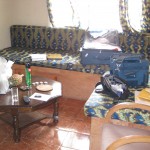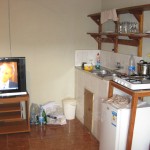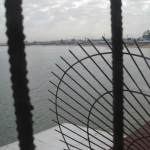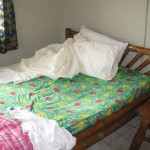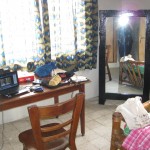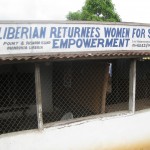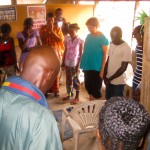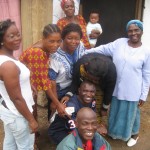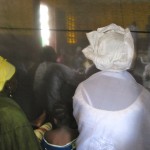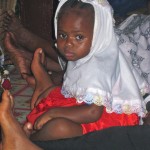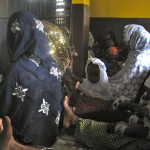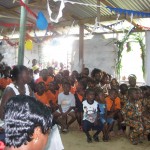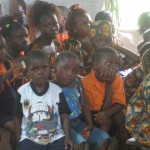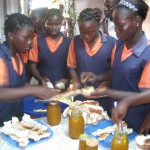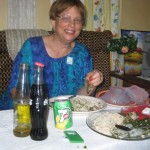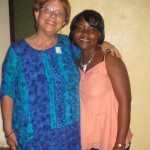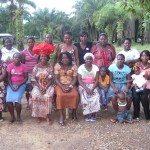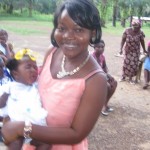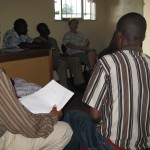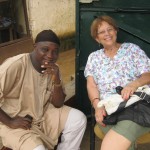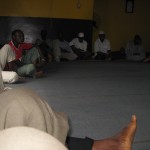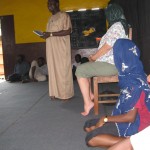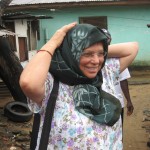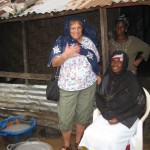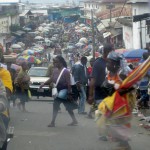Burundi Independence Day: There were 5 grandstands all together, maybe 150-200 people per grandstand. The president was in the central one. We were in the one to hizonner’s right, at the back. There were big leather overstuffed chairs for the prez and entourage, the rest of us on plastic stacking chairs. We were at the back of our grandstand, we couldn’t see himself except that when he spoke we could see the back of his head and the secret service crew.
To my surprise, Prosper didn’t seem to know anyone near us. The parade went between astounding and wonderful and crashingly boring. We watched thousands of military pass in review. We watched civil service groups, corporate groups, and school groups march past. It seemed hard to imagine that there was anyone in Bujumbura who WASN’T in the parade.�
But the music was astonishingly good. We got a good dose of the Royal Drummers. I think Wes and Bob got a bit bored by the drummers, but it was this powerful deep pounding bass rhythm that just got me every time. I didn’t bring my music recorder because I thought it would be in the way and/or rude to deploy the thing but I really wish I’d had it.
Bob got a lot of pictures, I got a few, Wes got quite a few and some video besides. I was shy of camera-popping, we were among the few who took very many pictures (collectively).
After, we agreed to go meet at Carama today and Prosper expects us to be blown away by the poverty and lack of planning ability and poverty of education and realize that we need him as intermediary in everything. ..we’ll go out to Carama tomorrow (today, as I write this) and meet the people and we’ll understand all we need to understand and we can go from there with our planning.
So, then, dinner at Prosper’s. We keep having little discussions on men’s and women’s roles in society here vs. there. Prosper asked me, “If your wife says, ‘I want to go to Seattle’ and you say, ‘NO, I forbid you to go’ and she goes anyway, what would you do? Here, she would not be welcome to come back.” The man is clearly the boss of the household here, although there are some obvious imbalances that are starting to grow. Elizabeth, Prosper’s office manager, for instance. She’s a beautiful woman, very smart, very good communicator. I really think she runs the office, coping and keeping up with Prosper’s whirlwind of activities and making sure everything works. We met her husband Desiree and I asked what type of work he does. He’s unemployed.�
So Prosper says, “If a man can’t buy his wife the nice clothes she deserves, what kind of man is that?” I didn’t ask Desiree his opinion on that.�
Yet, the women did all the cooking, the serving, the clearing. Wes and I joked about it, but we were NOT WELCOME to help. It felt awkward to not at least make a token effort, but a little moral righteousness wouldn’t have done anyone any good, it would have just made everyone uncomfortable ESPECIALLY the women. So we talked about the differences, but just talk.
In context of all this, we got on the subject of dowries. Turns out that Desiree got Elizabeth on credit for 20 goats that he has not yet paid back. I think he actually owes the cash equivalent of 20 goats, but it is not a debt of a million Burundi francs, it is a debt of 20 goats.
In Burundi, 2 cows is a pretty common price. Which is also interesting since traditionally the Tutsi are cattle raisers while Hutu are traditionally crop growers. Cain and Abel.
We had about 15 dishes altogether, we had fufu and tiny little fish in a spicy onion sauce, and fried pieces of a fish called mukeke.�
Some little funny bits to close with. Yesterday evening I left my windows open and fan on – and got a big ugly flying cock-a-roach in the room. I took pictures. Bastard was as big as my thumb and MEAN looking. Then after I’d spent what seemed like forever trying to get Comcast to work correctly and losing probably 40 mins of typing all together, I went to sleep with the fan on 3 instead of 1. That’s way too noisy and breezy – so I was up half the night wondering why I was so uncomfortable.
Today, we got back to the hotel at about 4 and I’ve been writing for much of the past 2 hrs. And then I’m going to bed.
… So far behind on updates. Hard to know where to begin. I’ll start with today, since it’s freshest and older stuff isn’t going to get fresher but the fresh stuff could go stale.
We spent the day today in Carama (Cha-RA-ma) which is the community that Prosper has built up from total wartime/conflict devastation. Today we were expecting to meet with a collection of local leaders to start understanding the community and our role in helping, our options.
Oh, let’s back up, shall we? Prosper had got us a rental car and driver that we’ve been using much of the time. He followed our directions and got something inexpensive. I guess we hadn’t counted on the fact that we’d have the 3 of us, plus a driver, plus a person from Prosper’s office to serve as guide and translator. It gets pretty cozy in the back of that little thing with 3 big guys shoved in, let me tell you. The guys say, “Brock, go ahead, sit in front, you need the room” which makes me wonder – am I really that fat? I’m dieting when I get home, fo’ sho. Anyway, clearly this wasn’t cutting it, so today Prosper had upgraded us to a beat up old Toyota land cruiser which is much more comfortable.�
Turns out, it’s a diesel. Turns out, diesel is very very hard to come by in Bujumbura these days. Turns out, I mean REALLY hard to come by. So we were driven over to the compound of the guy who rents the cars. Turns out he’s got a multi-faceted operation, we pulled into the compound to a huge sign for Eglise something-or-other, the church that is apparently the backbone of his operation. Plus a flashy building with a nightclub sign. Plus the car rental. Plus, as it turns out, a cabinet of musty old electronic equipment – VCRs, car speakers, a multi-meter, various unidentifiable junk – that he repairs, sells, whatever, plus a whole shelf of home-recorded VCR tapes that he probably rents. We had plenty of time to check all this out, because we had to wait while someone went to buy diesel.
While we waited, a lady came in who needed some attention to her car. Somebody brought motor oil in an old beer bottle. They didn’t want to spill any, so they made a funnel out of cardboard and poured out the oil like wine.
While we waited, we chatted with our driver du jour, Ledoc. Ledo is Prosper’s third oldest son (I think), a handsome and sharp young man who’s studying law in Nairobi. Ledoc was to be our translator.
It seemed like it took an hour, it was half an hour at the very least, but finally the guy showed up with a tiny little can of diesel. Prosper said it was 5 liters, and it cost something around $2 or $2.50 per liter. That was our ration for the day, fortunately it was to be a low-driving day.�
We got to the outskirts of Carama and saw the first water point. I was shameless, snapping photos of people just trying to get on with life. The water point had 2 taps, both in full use. The runoff wasn’t well handled, and made a fairly swampy area. People were grazing their cows, big lyre-horned beasts that I took at first for water buffalo. Whenever I’ve read about Tutsi cattle, they always call them “distinctively lyre horned” and now I know what they mean.�
Onusfor popped up out of the blue, and Dammas. We hung out for a bit, snapping photos and asking questions, and Prosper said it was time to go. Because of the time we’d spent waiting for gas, we went straight to the village meeting instead of touring about more.
We got to the center of the village and there was a collection of chairs set up in the shade of a big tree. Several village leaders were there already, and we were ushered to the seats of honor. There were probably ten or twenty people milling about or sitting and waiting for us when we got there, and I was thinking this would be pretty manageable.
I was hoping it would be manageable. I was terrified, I was having real heart-in-the-throat panic. It was so important, so important to me, to get this right. There were so many ways it could go wrong, and I was terrified that I’d steer us all into one or more of them. The biggest fear was that I’d leave them with an implicit commitment, “We’re going to come back and fix everything for you!” The last thing these people need is more disappointment.
It turned out we were waiting for the head of the district to come. Carama is in the district of Kinama which is in the commune of Bujumbura. The head of Kinama had gotten his schedule crossed, but after ten minutes or so, ten minutes while my pulse raced and I tried to keep my breathing steady, after ten or so rocky minutes for me he arrived in style. So this is what, maybe comparable to the mayor of Lynnwood? He was brought in one of the ubiquitous police trucks, a pickup truck with a bench down the middle of the bed. The bench is usually filled with armed police, guards, or soldiers. I think it was police this time. The whole time he was at the meeting, we were well protected by his two guards with Kalashnikovs. I felt quite secure. We were introduced, his name is “Emile”
So with the biggest man with us at the meeting, we could proceed. Prosper spoke, then the chief of Carama spoke, then the head of Kinama spoke. Unfortunately the head of Kinama had a pressing meeting and he had to leave immediately after speaking. I was not in fact disappointed to see him go.
In fact, all this speechifying had me calming down, so after Emile departed it was my turn. I think I did ok, I talked about global unity and GCJ does communication projects with a physical side, and we want to understand how they get things done here and hopefully come back in a year and I think it was ok.
Then Wes got up and got a bit rambly. Wes has the advantage of having the 40×40 project and the 10×10 projects on his balance sheet , so he gets to be a hero already. (NOTE: a friend of his from Coeur d’Alene raised $40K in 40 days to build 40 houses in 10 days!) We talked a bit about the stuccoing and latrines (the Wes and Brock project) but it’s not such a big deal. Wes of course playing to the crowd, he told how we’d ridden 44 hours on a plane to get here and he’s got the sore butt to prove it.
We got to Q&A, where the people got up in turn to ask us questions, or represent their needs, or just speak their piece. Some distinctive points (not all entirely high points)
In his intro, Prosper had spoken about how important women and women’s involvement in the meeting and the process were. There were several women represented (not to mention hordes of curious adorable children). One man said, “look, here are our women, please take a picture of them to take home to show people how we live”. So we did, then Prosper got Wes into the picture. It was nice.
Someone started talking about farming and Wes started riffing on the value of hard work, “Do you want to work hard? Do you want to work together? Do you want to farm?” Ledoc whispered to me “He’s going to be mayor of this place”. This was a low point for me, actually, Bob and I were sharing panicked looks and even Ledoc was voicing his concerns. A villager brought out 2 hoes and threw them on the ground and he and Wes picked them up and started to show how they can do hard work.�
This is a WAY WAY WAY fookin’ bigger problem than we can touch. Only in the most peripheral ways can we even get close to this one. Micro finance – that’s about it. We can’t help them rent land, we can’t bring them fertilizer, we can’t, well, do much of anything about farming. I jumped up and started throwing (metaphorical) cold water around, cooling down the crowd, mealy-mouthing Wes’s excitement, and I think no real damage was done.
I won’t go much further here, Bob took pretty extensive notes. Some big items: Water, electricity, microfinance, farming, education. (jumping ahead – the 3 of us debriefed a bit after and agreed that 1) there may be a good role for GCJ to use a community center as the heart of an investment that we commit to and then raise funds towards other pieces. My biggest concern there is to start spec’ing these ideas out so we can really know if we can do any of them)
(Also – one thing they said was, “$600 would send 10 kids to driving school and then they could get jobs” to which both Wes and I thought, “Damn, I could do that right now” so we may do that also)
Then we started touring the community. We looked in the house of a haggard old woman and I felt like a bastard, stomping around in my big fat American boots taking pictures of her devastation. We looked at the “ditch water” that has been what people have been drinking since before the water came from Regideso and it actually looked more like a small stream than the putrid irrigation ditch I’d expected. We crossed the stream on a rickety bridge (Prosper says, “Another small project is we need to replace this with a bigger, stronger bridge” and I’m thinking, Ka-ching, here’s another project I could just DO.)
We looked at a church construction that was awaiting funding for the next step. It actually looked pretty grand compared to everything else around.
We saw houses, we saw goats. We saw some houses that are being started and built right now (are these the 10×10? I’m really just not sure. I hope Wes knows, I hope Wes got what he needs from that.)
We saw another water tap. It’s not functioning yet, and it turns out they just don’t have the taps for it yet, just the taps, the faucets. “WTF!?!?” thinks me, “how much can that cost!?!?!” and I asked Prosper, can we just go to the local equivalent of a hardware store and BUY SOME DAMNED FAUCETS?” and he was ahead of me on it, giving the chief of Carama $30 to just do it. There’s something quite broken communication-wise here – how long were they going to wait until Regideso got around to it?
More house building, more chatting. I chatted with 2 pygmy (I think) brothers (they came up to my shoulder) who spoke surprisingly good English.�
Oh have I neglected to talk about the kids? How could I do that? We were surrounded by kids at every step. Every one of the little darlin’s a terrorist, the one universal kid greeting, the one that sends them into laughter and smiles is a good old fashioned terrorist fist bump. Even better the thumbs up fist bump, or a fist bump where you say “Cha!”
And that kinda broke my heart a little bit, ok, more than a bit, thinking how many of these adorable little rugrats won’t see puberty.�
Christ, I feel so overdone, so hyper compressed, so strung out. This is hard work. This is hard.
But nothing like a passel of kids to lift your heart, I almost got left behind fist bumping and poking bellies with my finger. One bold little guy in a ragged red shirt had learned a few words of English “Hello, teacher!” “Hello, Class!” and we even got “What’s your name?” (He’s Claude, btw). A surprising number of kids had a smattering of English, and lots of kids had French.�
Ok, that’s all I got, really. All that matters. All that matters for now.
�
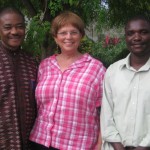 In the cool shade of his garden, encircling a tree, we enjoyed a fascinating visit with Emmanuel Bowier, a wonderful man who is an expert on Liberian culture: we may partner on the INCHR proposal. Emmanuel B explained how originally the Palava Hut process was a circle ‘owned’ and initiated by the community. In more recent years, it has become more Chief focused and run – which has undermined its effectiveness as many of the younger generation don’t have much regard for chiefs or elders. They grew up in the chaos of the civil war; many were combatants or forced companions to combatants. They didn’t have any experience of an intact culture. And women hold little trust with any justice system, traditional or legal. There is indeed often abuse. Plus the chiefs often ask for money. So there seems a genuine opening and need for Restorative Circle practice – which in a way is bringing them back to their roots since it is so akin to the Palava Hut. One traditional practice that E.B. described seems like a brilliant option for RC: the conflict parties would typically bring a Respresentative (perhaps their sister or mother or father) who would speak for them, rather than their speaking directly. This makes especial sense in Liberian culture which tends to be much more indirect in communication style. And it creates even greater safety – very wise in so many cases, such as a victim of any violence in a Circle with the actor. As an aside, EB’s personal history reflects a common challenge in Liberia where past affiliations make it difficult to find current day roles. In the early days of the overthrow of the government when hopes were high for a more just and inclusive Liberia, EB served as Minster of Communications under Samuel Doe. Of course that regime became increasingly brutal and was overthrown by factions that threw the region into brutal civil wars for 16 years.
In the cool shade of his garden, encircling a tree, we enjoyed a fascinating visit with Emmanuel Bowier, a wonderful man who is an expert on Liberian culture: we may partner on the INCHR proposal. Emmanuel B explained how originally the Palava Hut process was a circle ‘owned’ and initiated by the community. In more recent years, it has become more Chief focused and run – which has undermined its effectiveness as many of the younger generation don’t have much regard for chiefs or elders. They grew up in the chaos of the civil war; many were combatants or forced companions to combatants. They didn’t have any experience of an intact culture. And women hold little trust with any justice system, traditional or legal. There is indeed often abuse. Plus the chiefs often ask for money. So there seems a genuine opening and need for Restorative Circle practice – which in a way is bringing them back to their roots since it is so akin to the Palava Hut. One traditional practice that E.B. described seems like a brilliant option for RC: the conflict parties would typically bring a Respresentative (perhaps their sister or mother or father) who would speak for them, rather than their speaking directly. This makes especial sense in Liberian culture which tends to be much more indirect in communication style. And it creates even greater safety – very wise in so many cases, such as a victim of any violence in a Circle with the actor. As an aside, EB’s personal history reflects a common challenge in Liberia where past affiliations make it difficult to find current day roles. In the early days of the overthrow of the government when hopes were high for a more just and inclusive Liberia, EB served as Minster of Communications under Samuel Doe. Of course that regime became increasingly brutal and was overthrown by factions that threw the region into brutal civil wars for 16 years.
